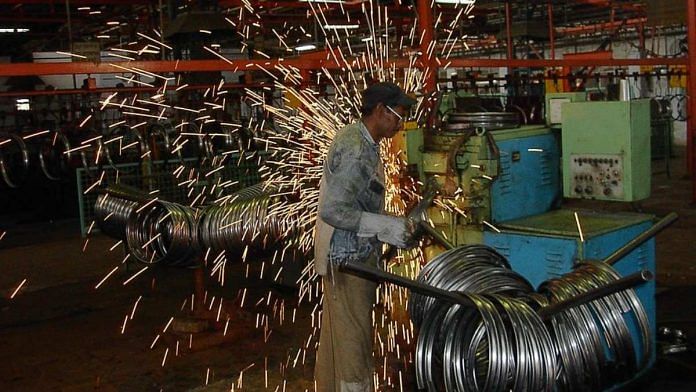New Delhi: The Narendra Modi government is planning to bring an ordinance to amend the Factories Act to allow manufacturing units and factories to start production in a limited capacity during the lockdown, ThePrint has learnt.
The ordinance will permit 12-hour shifts, instead of the current eight hours, allowing factories and manufacturing units where work has come to a halt to start production with at least one-third of the labour force, say government sources. The government is also considering allowing operations in districts that have no Covid-19 cases, the sources added.
“The additional four hours after the eight hours could be treated as overtime … Factories can break the 12-hours into two slots of six hours each, allowing workers to stay and rest at the factory premises itself. However, owners will have to strictly ensure that workers are adhering to social distancing protocols,” said one of the sources.
The Factories Act, 1948, mandates that a worker, who is otherwise entitled to a weekly holiday, shall not be allowed to work in a factory for more than 48 hours in a week.
“An ordinance will have to be brought to amend the Factories Act, 1947 as the Parliament is not in session. The ordinance will be approved in Parliament when it convenes,” said a second source.
The second source added that the recommendation to amend the law was made by one of the 11 empowered groups set up by the government to identify problems that have arisen during the 21-day lockdown and provide effective solutions.
The lockdown, imposed on 25 March to prevent the spread of coronavirus, brought all commercial activity to a standstill, severely impacting the economy not just in India but across the world. The IMF in March said the world was in a recession.
The closure of factories and other business resulted in a mass movement of labourers from cities to their villages in Uttar Pradesh, Bihar and other states. The exodus not only raised concerns of a further spread of the disease but also drew criticism on the government’s handling of the situation given the loss of livelihood for thousands of workers.
With the end date of the three-week lockdown approaching (14 April), the Centre will soon announce its decision on whether it is extending it or easing it after Prime Minister Narendra Modi interacts with all chief ministers on 11 April.
Also read: Shops open on alternate days, schools shut — states want to phase out lockdown after 14 April
Vulnerability mapping
Among the states, Karnataka Chief Minister B.S. Yediyurappa has favoured, subject to central approval, lifting the lockdown in districts that have not yet reported any Covid-19 positive cases to allow businesses to start.
The second source said that the empowered committee wants to start only those factories where no infections have been reported.
“As on date, out of the 700-odd districts, only in 275 districts (have) one or multiple cases been reported. There are a large number of districts where not even a single case has been reported. Factories in such areas can start operation,” the source added.
One of the empowered committees has already recommended conducting a vulnerability-mapping of districts affected by coronavirus to help prepare an action plan. This will elaborate on what all can be allowed in different districts based on the extent of the spread of the virus.
According to Johns Hopkins University’s Covid-19 tracker, as of Friday afternoon, the total number of cases in India reached 6,771. This includes 228 deaths and 635 recoveries. According to the Union health ministry, there are 6,039 active cases.
Also read: Is talk of lifting lockdown premature or is it necessary to allow some economic activity?
Supply chain
The empowered committees are also working on ways to normalise the supply chain of essential commodities.
One of the source quoted earlier said the group that deals with facilitating supply chain and logistics management for availability of items such as food and medicine is in constant talks with truckers association to address the challenges being faced.
The truckers are currently either stuck inside factory premises or are on state and national highways. This empowered group is headed by the Ministry of Drinking Water and Sanitation secretary Parameswaran Iyer.
“Though the government has directed states to allow movement of trucks carrying both essential and non-essential goods, representatives from trucker association said that on the road, truckers are still being harassed by the police. The Centre is in constant touch with the states to ensure that issues related to truckers are resolved,” the source said.
Also read: What if coronavirus crisis had hit India under Manmohan Singh, not Modi



